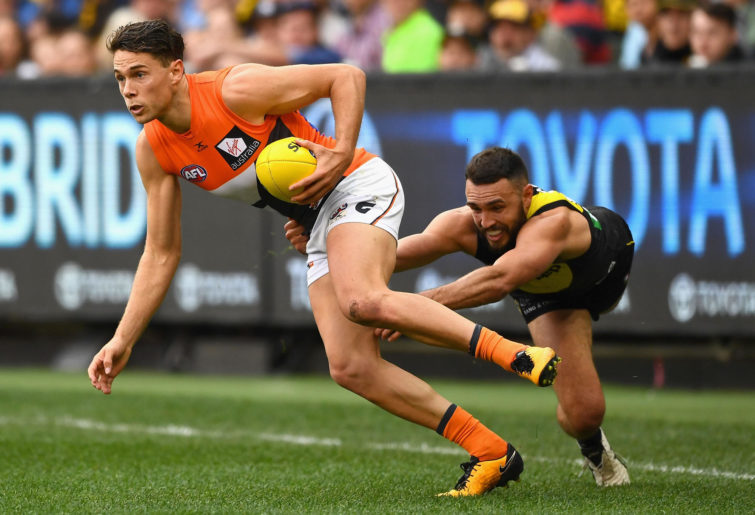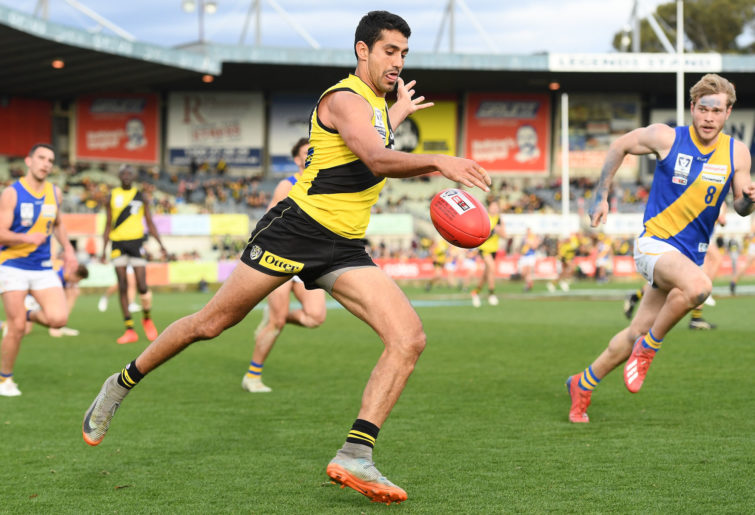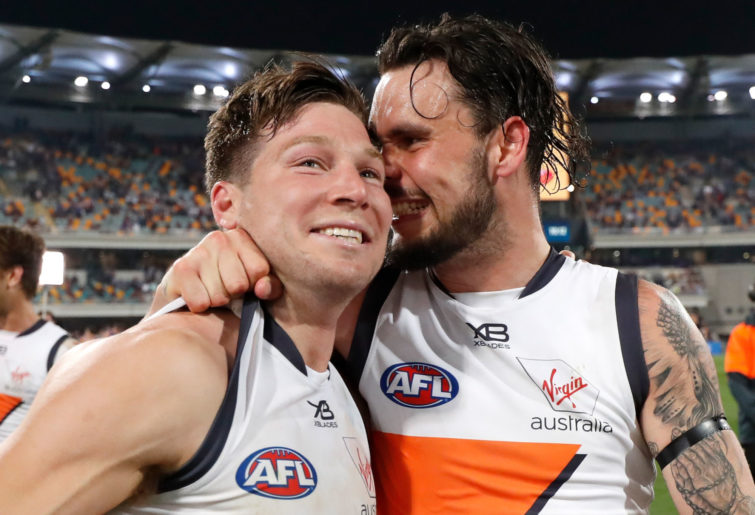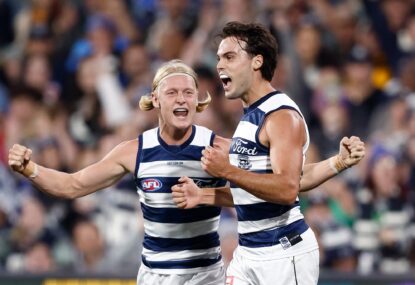There has never been a grand final victor from the sixth seed, which is where the Giants finished the season.
Only one team has even reached the finale starting in the number six slot, and by comparison, that Carlton team had an easier path two decades ago.
1999 was the last year when seed one played eight, two played seven, and so forth. Carlton lost to third-seeded Brisbane, but when seeds seven and eight also lost, the Blues were moved into the semis, where they beat fifth-seeded West Coast. Then they upset top-seeded Essendon 104-103 in the prelim before losing to the Kangaroos in the GF by 35.
But the Giants are the first sixth-seeded team to pull three wins out of their hats in one finals campaign. Teams starting in the number six spot have 23 wins and 32 losses over 29 Septembers. Despite having a home elimination final for the last 20 years, only five teams have managed two wins. Besides this year’s Giants, there were the 2014 Kangaroos, the 2007 Magpies, the 2001 Hawks, and those 1999 Blues.
For the sixth year in a row, the minor premiers will not win the grand final. That’s the longest such streak in AFL/VFL history; in fact, five was already the record before Geelong extended it Friday night by losing to the Tigers.
In fact, that streak extends to ten of the last twelve seasons, interrupted only by Hawthorn in 2013 and Collingwood (just barely!) in 2010. And in three of the last five seasons, the minor premier failed to even make the grand final (including Richmond last season and Fremantle in 2015).
In the 25 previous seasons of the eight-team finals series, with seven competitors to deal with in September, the minor premiers have only eight victories to show for their troubles (31 per cent) – the second-place clubs, oddly, have nine.
Before 1994, the top seed’s record was 60 for 97, also about 62 per cent – right about twice the percentage since that date.
There have also been five winners from the third seed (which is where Richmond won their last title from, two years ago) and one each from seeds four, five, and seven.
In order: Adelaide ’97, Adelaide ’98, and Bulldogs ’16.

GWS and Richmond are this year’s AFL grand finalists. (Photo by Quinn Rooney/Getty Images)
Why has this happened now? What’s different than all of the years prior when the top seed was likely to run the table in finals – for example, in the final six years before the name change from “Victorian” to “Australian Football League” (1984-89), the minor premiers went six-for-six in making and winning the grand final (thrice for Hawthorn, twice Essendon, and once Carlton).
Over the course of the 93 years of the “original” VFL, the winner of the home-and-away season also won the grand final in 58 of those campaigns (over 62 per cent of the time); in the now-30 seasons of the AFL, however, those winners are only batting one-for-three, or 33 per cent.
Why? The number of opponents matters.
We can look back to 1897 for confirmation of this, as the original finals set-up split the eight teams into two groups of four by even and odd placements, running a three-game round-robin followed by a Final between the two winners.
In the first five years, there was only one team to win both regular season and premiership titles. That seems to strengthen the increased difficulty of the “sheer number of opponents” theory.
And that’s a common-sense thought – the more opponents you can lose to, the more likely it is that you’ll lose. Ask any professional golfer: Tiger Woods winning half the tournaments he played in one season was unheard of on the PGA tour when fifty or one hundred golfers tee it up each weekend.
Yet the United States won the America’s Cup yachting competition without a loss for well over a century, in part because they had only one opponent each year to race against. (And also because the cup-holder got to set the course and conditions for each race. But I digress.)
Richmond avenged its loss from last year to some extent – it wasn’t Collingwood (and they won’t get that chance next week after all), and Mason Cox wasn’t there (he just couldn’t “see” his way to being there…), but they got through that pesky preliminary final that stopped them last year.
Would Tom Hawkins have made three goals of difference? We’ll never know, but the way that game unfolded, it seemed to be won elsewhere anyway: in the alleys between the fifties.
Dustin Martin, Bachar Houli, Tom Lynch, Trent Cotchin, and Dion Prestia were outworking their Geelong competitors for the footy throughout.

Marlion Pickett of the Tigers (Photo by Quinn Rooney/Getty Images)
Meanwhile, Paddy Dangerfield was his usual terror to the enemy; Gryan Miers was remarkable for a rookie, enough to become the target of the Tiger Army’s “affections”.
Tim Kelly either made a tremendous effort for his chosen club or produced a farewell performance for the ages before moving west. Gary Ablett was hit and miss Friday night, maintaining the effort he always gives but through the middle two quarters always seemed to be passing the ball to someone in black.
If it was his last game, it was a fitting performance – it showed some of those skills that made him the greatest player of his generation, but it also showed slippage in some of those skills that indicate it’s probably time to set the top level of the game aside.
On the other side of the oval this coming Saturday will be the Greater Western Sydney Bulldogs – sorry: Giants! But their run through the finals this month has had the same feel as Luke Beveridge’s crew three seasons ago, where against all expectations the Western Bulldogs ran the gauntlet as road warriors despite flailing at the end of the regular season.
The player list was so depleted that the Giants were checking to see if Stevie J was willing to don the charcoal and orange again. Watching the game on television, I wondered aloud if the team of GWS players watching the games in street clothes could (on a healthy day) defeat the team on the field Saturday in the rain.
Speaking of the rain, the Magpies obviously struggled handling the ball in that soaking-wet third period, but came on like a house-on-fire once it dried up in the fourth. (Or they woke up the moment they heard the broadcasters declare the outcome as decided. You choose.)
But Richmond won’t fall apart if it rains – in fact, wet weather’s their forte. The Giants’ forte, at least during finals so far, has simply been their superior work rate – ironically, the same thing that pushed the Bulldogs of 2019 to the heights they reached in the second half of the season.
Can they keep that edge against a Tiger team who deals in effort, speed and strength weekly? The pundits will say no – three goals worth of “no”, according to the opening line, which sets Richmond as 18.5-point favourites.
Personally, I’ve tipped against the Giants three games in a row, and I don’t plan on changing now! (I also tipped the Lions twice. Otherwise, I’m a perfect four-for-four.)
Of the eight finals games so far, only two were won by the definitive favourite – West Coast over Essendon, and Richmond’s win Friday night. Geelong was a slight preference to the Eagles among the tipsters we track, and the team-less-trusted won the other five opportunities.

Toby Greene (left) and Zac Williams of the Giants celebrate (Photo by Michael Willson/AFL Photos via Getty Images)
The two biggest upsets, however, came from the youngest team in the league over the last two weeks. In fact, there were 106 occasions (out of 206 games played so far) in 2019 when every single source we monitor at “Following Football” – between 20-23 every time – agreed on the predicted winner of a game.
For the 29th time this season Saturday, we were all wrong.
So even if every single prediction goes Richmond’s way this week, here’s our comfort, fellow Giants fans: History and statistics tell us that Leon Cameron’s boys will still have better than a 27 per cent chance of winning their first-ever AFL championship on the last Saturday in September.





































































































